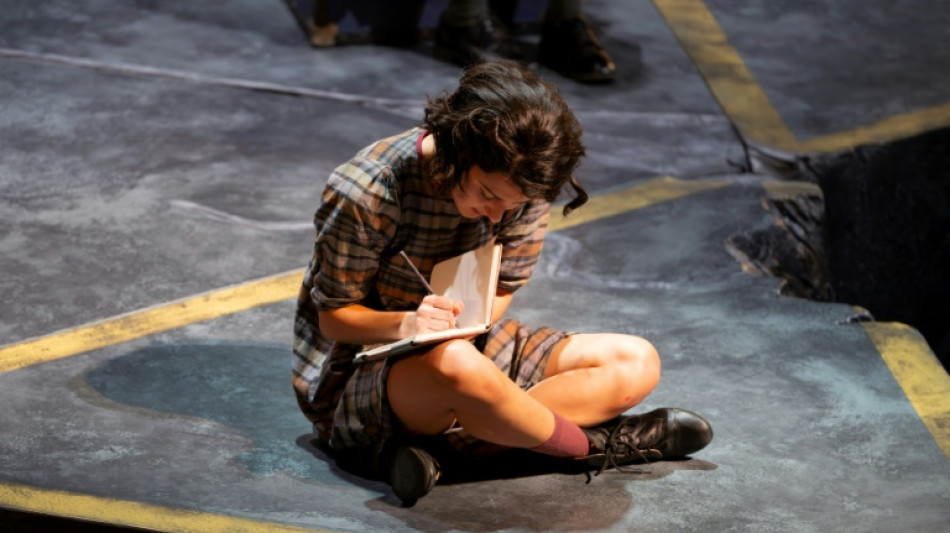

Anne Frank musical hits Dutch stage, 'we should never forget'
A new musical production based on Anne Frank's diary has hit the stage in The Netherlands, with the producer and star convinced the story needs telling now more than ever.
"Je Anne" ("Yours, Anne") sticks faithfully to the account of the Jewish teenager whose story of hiding from the Nazis in war-time Amsterdam has become famous around the world.
The stage consists only of a concrete Star of David divided into sections representing the rooms in the "secret annex" where the Frank family and four others hid for more than two years.
The eight characters rarely leave the star, perching on bits of luggage, their only worldly possessions, creating a tense sense of claustrophobia throughout the production.
Producer Mark Vijn said he still gets goosebumps thinking about the couple of hours he spent in the real annex, which was hidden behind a revolving bookcase.
"We were only there for a couple of hours, and they were there for two years. And they didn't know they were going to be there for two years," Vijn told AFP.
Vijn dismissed critics who say a musical is an inappropriate medium for such a tragic story, saying it heightens the emotion and appeals to a new generation.
"It's the first production where music is used to tell the story. We made this with music because it is more suitable for a broader audience, especially a younger audience."
The musical, shown for the first time on Saturday to a full house in the northern Dutch town of Beverwijk, is a reboot of a 2010 production.
Vijn said current events inspired him to remake what he called "Je Anne 2.0."
"It's a story that needs to be told all the time," he said.
Incidents of anti-Semitism in the Netherlands doubled last year, according to a recent report by the CIDI group, which monitors such episodes.
Anti-Semitic attacks have risen around the world since the war in Gaza erupted on October 7, sparked by an unprecedented attack by Hamas militants on Israel.
"It's history repeating over and over. We should never forget what happened back then and that's why we're doing it again," the producer, 56, said.
- 'There's always hope' -
The songs chart the range of emotion portrayed in the diary, with moments of happiness and joy interspersed with the haunting sound of bombing, police sirens, and the screams of Anne as she wakes from nightmares.
Punctuating the music are reports from the radio, where the fate of Jews deported from the Netherlands to the gas chambers becomes increasingly clear.
The play ends with a powerful final number where the characters believe liberation is imminent.
Hearing news of D-Day, they dance around singing "finally free", packing up coats stamped with yellow Stars of David and preparing to leave their "waiting room".
The song is interrupted by a police siren, as the family is betrayed to the Nazis.
One by one, they leave the stage as the actor playing Otto, Anne's father, reads out their fates -- "Died in Auschwitz", "Died in Bergen-Belsen."
Anne is last to leave the stage. The real Anne was taken first to Camp Westerbork transit station, transferred to Auschwitz, then Bergen-Belsen, where she died of typhus fever.
At the end, the only thing left on stage is the diary, Anne's legacy to the world. Saturday's audience, first deathly silent, rose to a prolonged standing ovation.
In the audience was Jean Westerling-Nelissen, now 94, who was born on the same day as Anne Frank.
"It's something I experienced there myself," she said, although she was not pursued by the Nazis.
"Just the fear, you didn't have that because... you didn't have to hide."
Silvana Rocha, 22, who plays Anne, read everything she could about the girl whose diary is seen as a warning against the dangers of totalitarianism.
She believed Anne would be "really sad, upset, and disappointed" about the recent rise of anti-Semitism.
"I mean, we haven't learned. And I don't think we will ever learn," Rocha told AFP.
But many see in the diary a story of hope and resistance and Rocha said she thought a modern-day Anne would "just fight harder and stay stronger to spread her message."
What is that message?
"Take care of each other, look around. Do not close your eyes. Do not be blind. Because you can see it. It's a choice not to see it."
"And there's always hope."
M.Scott--NG



